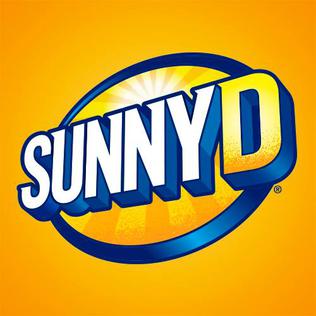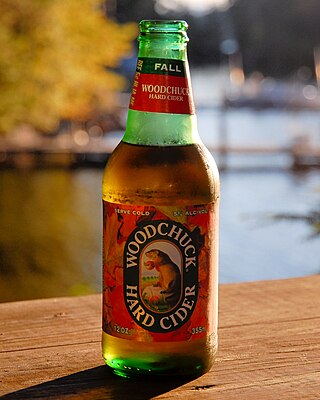Perry, also known as pear cider, is an alcoholic beverage made from fermented pears, traditionally the perry pear. It has been common for centuries in England, particularly in Gloucestershire, Herefordshire, and Worcestershire. It is also made in parts of South Wales and France, especially Normandy and Anjou, and in Commonwealth countries such as Canada, Australia, and New Zealand.
Odwalla Inc. was an American food product company selling fruit juices, smoothies and food bars founded in Santa Cruz, California in 1980 and from 1995–2020 was headquartered in Half Moon Bay, California. Odwalla's products included juices, smoothies, soy milk, bottled water, organic beverages, and several types of energy bars, known as "food bars".

SunnyD is an orange drink developed in 1963 by Doric Foods of Mount Dora, Florida, United States. Additional plants were built in California and Ohio in 1974 and 1978, respectively. In April 1983, Sundor Brands bought out Doric Foods; Sundor Brands was then purchased by American multinational Procter & Gamble in March 1989. The drink is superficially related to orange juice, but also resembles a soft drink without carbonation.

Sunkist Growers, Incorporated is an American citrus growers' non-stock membership cooperative composed of 6,000 members from California and Arizona. It is currently headquartered in Valencia, California. Through 31 offices in the United States and Canada and four offices outside North America, its sales in 1991 totaled $956 million. It is the largest fresh produce shipper in the United States, the most diversified citrus processing and marketing operation in the world, and one of California's largest landowners.

Woodchuck Hard Cider is a brand of hard cider produced by the Vermont Hard Cider Company, LLC, in Middlebury, Vermont. In 2011 it was the top-selling hard cider in the United States, capturing approximately 47% of the hard cider market in the country.

Golden Circle is a subsidiary of US-based Kraft Heinz, based in Brisbane, Queensland. Its main operations are food processing. Golden Circle was inducted into the Queensland Business Leaders Hall of Fame in 2010, for its significant contribution to the economy of Queensland through the processing of food products, notably fruit and vegetables.
Clearly Canadian is a brand of premium flavored and unflavored sparkling and springwater, that is produced by The Clearly Food & Beverage Company Ltd., of Canada. The brand was founded in 1987 in British Columbia, Canada. Outside of Canada, it is well known throughout the United States, parts of Europe and Japan.

Welch Foods Inc., commonly known as Welch's, is an American company, headquartered in Concord, Massachusetts. It has been owned by the National Grape Cooperative Association, a co-op of grape growers, since 1956. Welch's is particularly known for its grape juices, jams and jellies made from dark Concord grapes and its white Niagara grape juice. The company also manufactures and markets an array of other products, including refrigerated juices, frozen and shelf-stable concentrates, organic grape juice, fruit snacks, and dried fruit. Welch's has also licensed its name for a line of grape-flavored soft drinks since 1974. Welch's grape and strawberry soda flavors are currently licensed to Global Beverage Corporation. Other popular products that use the Welch's name are the fruit snacks made by The Promotion In Motion Companies, Inc.
Tropicana Brands is a former American fruit-based beverage company. It was founded in 1947 by Anthony T. Rossi in Bradenton, Florida. Between 1998 and 2021 it was a subsidiary of PepsiCo, but in August 2021, 61% of Tropicana was sold along with the rest of PepsiCo's juice brand portfolio for $3.3 billion to PAI Partners. PepsiCo retained the remaining 39% of ownership.
The Jim Pattison Group is a Canadian conglomerate based in Vancouver. In a recent survey by the Financial Post, the firm was ranked as Canada's 62nd largest company. Jim Pattison, a Vancouver-based entrepreneur, is the chairman, CEO, and sole owner of the company. The Jim Pattison Group, Canada's second largest privately held company, has more than 45,000 employees worldwide, and annual sales of $10.1 billion based on investments in Canada, the U.S., Mexico, Europe, Asia and Australia. The Group is active in 25 divisions, according to Forbes, including packaging, food, forestry products.

Arizona Beverages USA is an American producer of many flavors of iced tea, juice cocktails, and energy drinks based in Woodbury, New York. Arizona's first product was made available in 1992, to compete with Snapple. Both companies originated in New York.
J&J Snack Foods Corporation (JJSFC) is an American manufacturer, marketer, and distributor of name brand snack foods and frozen beverages. Headquartered in Pennsauken, NJ, JJSF uses over 175 facilities for manufacturing, warehousing, and distributing located in 44 states, Mexico, and Canada. The company is listed on the NASDAQ Global Select Market as “JJSFC”, and serves both national and international markets.

Kraft Foods Inc. was a multinational confectionery, food and beverage conglomerate. It marketed many brands in more than 170 countries. 12 of its brands annually earned more than $1 billion worldwide: Cadbury, Jacobs, Kraft, LU, Maxwell House, Milka, Nabisco, Oreo, Oscar Mayer, Philadelphia, Trident, and Tang. Forty of its brands were at least a century old.

Monster Beverage Corporation is an American beverage company that manufactures energy drinks including Monster Energy, Relentless and Burn. The company was originally founded as Hansen's in 1935 in Southern California, originally selling juice products. The company renamed itself as Monster Beverage in 2012, and then sold their Hansen's juices and sodas and their other non-energy drink brands to The Coca-Cola Company in 2015.
Parle Agro Private Limited is an Indian company that owns Frooti, Appy, LMN, Hippo and Bailley brands.
Kelowna Pacific Railway was a short-line railroad, formerly a Canadian National Railway line, leased by Knighthawk Rail. The KPR's line ran from Kelowna to Kamloops through the Okanagan Valley. Operations started on January 30, 2000, and ended on July 5, 2013, when the company entered receivership.

Old Orchard Brands, LLC is a Sparta, Michigan-based juice company, owned by Lassonde Industries.

China Huiyuan Juice Group Limited, established in 1992 and headquartered in Beijing, is the largest privately owned juice producer in China. It is engaged in the manufacture and sales of juice and other beverage products. Its products include fruit juice and vegetable juice, nectars, bottled water, tea, and dairy drinks.

Cider is an alcoholic beverage made from the fermented juice of apples. Cider is widely available in the United Kingdom and the Republic of Ireland. The UK has the world's highest per capita consumption, as well as the largest cider-producing companies. Ciders from the South West of England are generally higher in alcoholic content. Cider is also popular in many Commonwealth countries, such as India, Canada, Australia, and New Zealand. As well as the UK and its former colonies, cider is popular in Portugal, France, Friuli, and northern Spain. Germany also has its own types of cider with Rhineland-Palatinate and Hesse producing a particularly tart version known as Apfelwein. In the U.S., varieties of fermented cider are often called hard cider to distinguish alcoholic cider from non-alcoholic apple cider or "sweet cider", also made from apples. In Canada, cider cannot contain less than 2.5% or over 13% absolute alcohol by volume.

Lassonde Industries Inc. is a Canadian agri-food company located in Rougemont and Montérégie, with operations throughout North America.












